13 Best B2B Contact Databases for Sales and Marketing in 2025
A B2B contact database provides information about business profiles, contains accurate contact information for decision-makers and targetable roles, improves lead generation efficiency, and allows you to increase the efficiency of your outreach efforts.
Contact database companies help sales teams in pipeline growth and revenue opportunities. They remove the guesswork in finding qualified leads and reduce time spent on manual research.
Some of the best contact databases are BookYourData, UpLead, Apollo.io, ZoomInfo, Clearbit, Cognism, Kaspr, Seamless.AI, RocketReach, LinkedIn Sales Navigator, and Lusha. These tools are trusted for data quality, user-friendly interfaces, and CRM integrations.
The best contact databases for sales and marketing in 2025 are listed below.
- BookYourData: BookYourData is a real-time email list builder that allows you to filter by industry, location, job title, and seniority level to get 97% accurate business leads.
- Clearbit: Clearbit is a platform that offers real-time data-finding tools to help fill in missing contact or company details, making marketing and sales more efficient.
- AeroLeads: AeroLeads is a simple B2B lead generation tool that helps find business emails and phone numbers from LinkedIn and other sources, including websites and social media.
- Apollo.io: Apollo.io offers a contact database with tools for outbound sales, like email automation and activity tracking.
- Cognism: Cognism offers GDPR-compliant B2B contact data, with a strong focus on Europe and accurate intent-based targeting.
- Seamless.AI: Seamless.ai is a tool that uses AI to find B2B emails and phone numbers while keeping contact info up-to-date and accurate.
- Kaspr: Kaspr is a lead generation tool that helps users find phone numbers and emails directly from LinkedIn profiles in real-time. It’s great for sales reps looking to speed up outreach.
- LinkedIn Sales Navigator: LinkedIn Sales Navigator helps businesses find and target B2B leads by tracking buyer intent signals like profile views, content engagement, and company interactions.
- RocketReach: RocketReach is a tool that helps users find emails and social media links for professionals across industries, and it is often used for outreach and recruiting.
- ZoomInfo: ZoomInfo is a powerful B2B contact database that offers deep company insights, verified leads, and tools for finding the right targets.
- UpLead: UpLead is a tool that provides verified B2B contact data and ensures real-time email verification to reduce bounce rates.
- Lusha: Lusha is a lead generation tool that provides accurate B2B contact details and integrates easily with CRMs, making it best for sales and recruitment teams.
- ContactOut: ContactOut allows users to build lead lists, conduct bulk searches, and export data directly to CRMs with its large database.
1. BookYourData

BookYourData is a B2B data intelligence platform that provides real-time verified information to sales, marketing, and recruiting teams to build, customize, and download targeted email lists in real-time. The platform offers access to over 250 million business contacts across 200+ countries, with a 97% data accuracy guarantee. Users can filter leads by location, job title, company size, industry, and more, then purchase and export them instantly, unlike traditional email search engines. It is also a valuable resource for professionals seeking sales tips to refine their outreach strategies and connect with the right decision-makers faster.
What makes it unique?
BookYourData offers real-time verified data and pay-as-you-go email list building without long-term contracts.
Key features
- Build targeted email lists online
- Real-time data download
- Filter by industry, job title, location, and more
- Custom email list builder
- CRM-ready CSV files
- Instant email verification
- Direct contact info access
- Data cleansing and updating
- GDPR and CCPA compliance
- Email finder tools
- Perform email searches by name for precise lead targeting
- Access sales email template suggestions for effective outreach
Pros
- No subscription required
- High deliverability rate(97% Guarantee)
- Real-time email verification
- Quick list customization
- Easy-to-use interface
- Supports CRM integrations
- Fast data access
Cons
- The pay-as-you-go model may require budgeting for high-volume needs
- List performance can depend on the niche or industry selected

Pricing
The pricing plans of BookYourData are listed below.
- Free pack: The Free pack of BookYourData costs $0 with 10 free credits, without a credit card.
- Pay-as-you-go pack: This plan costs $99 for 250 credits without a subscription. This is the highest rate per credit, but pricing becomes more cost-effective with larger credit bundles. Each credit equals one contact, and the credits do not expire.
Customer reviews
BookYourData is appreciated for its flexible pay-as-you-go model, fresh leads, and easy-to-use interface. Some users suggest improved job title categorization, but filters help refine results effectively. It has a rating of 4.9 at G2 and 5 at Capterra.
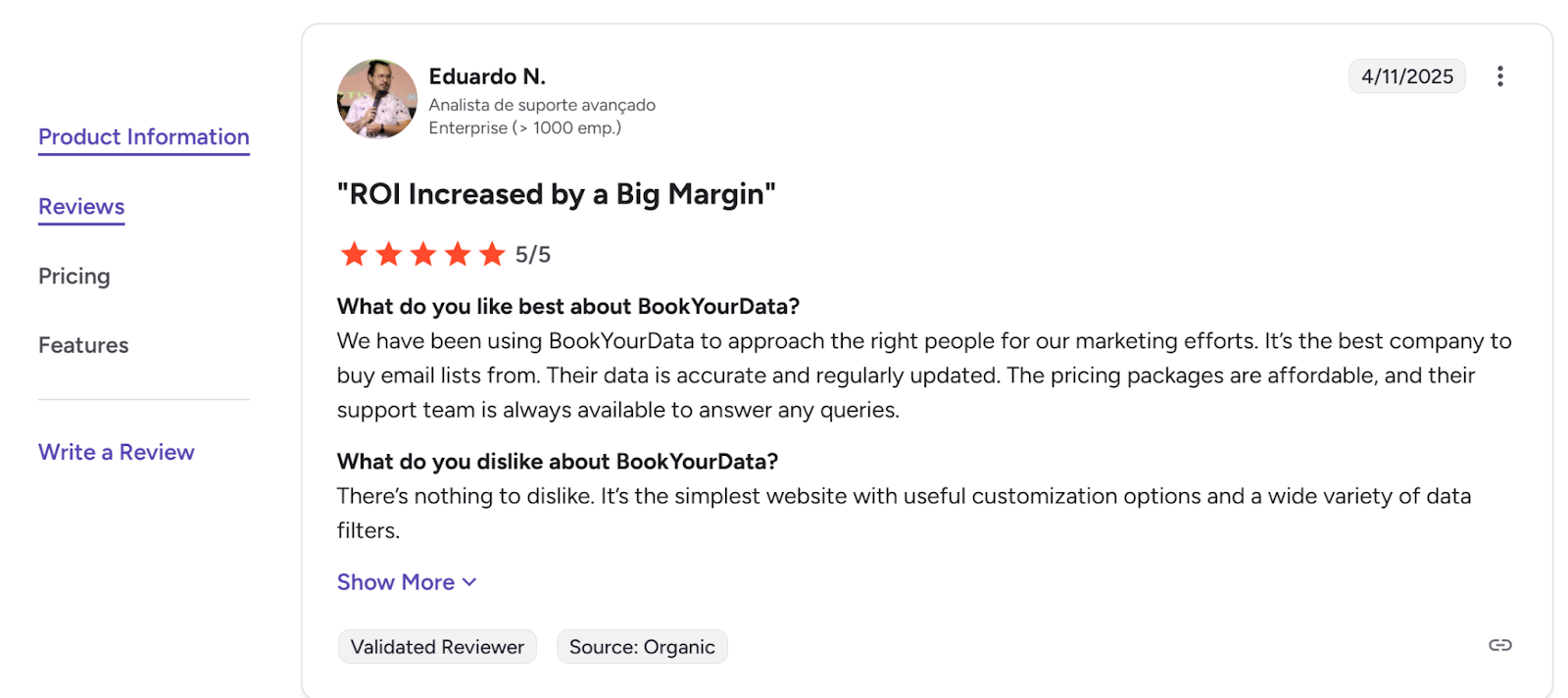
2. Clearbit

Clearbit, now known as Breeze Intelligence for HubSpot, is a data enrichment and B2B intelligence platform that helps lead generation businesses discover, qualify, and engage with leads using real-time company and contact data. It is designed for marketing, sales, and operations teams to enhance customer profiles and improve targeting. Clearbit integrates directly with CRM and marketing platforms to deliver enriched insights automatically.
What makes it unique?
Clearbit offers real-time enrichment that instantly reveals detailed firmographic and demographic data from just an email or domain.
Key features
- The Reveal tool identifies anonymous website visitors by matching IP addresses to company profiles.
- The Prospector feature helps users find decision-makers using filters like industry, role, and location.
- Clearbit Enrichment adds firmographic and technographic data to existing CRM records in real time.
- Supports integrations with Salesforce, HubSpot, Marketo, and Segment.
- Real-time APIs for custom data workflows (company size, revenue, industry, and technology stack)
Pros
- Easier to use data for marketing and sales
- A data vendor helps you find better leads and organize them easily
- Gives up-to-date information to reach the right people
Cons
- Not publicly listed pricing structure
- Difficult learning curve for new users
Pricing
Clearbit’s pricing is not publicly listed for most features and is based on usage and scale. It offers a Free plan for Reveal with limited visitor data. Paid plans for Enrichment and Prospector are available through custom quotes and depend on the number of records or monthly data calls. API-based billing is used for large-scale operations, and pricing changes with contact volume and feature access.
Customer reviews
Users liked the intuitive interface of Clearbit and the product and data quality. But some users report occasional data inaccuracies and suggest improvements in customer support. This platform got 4.4 stars out of 5 on G2.
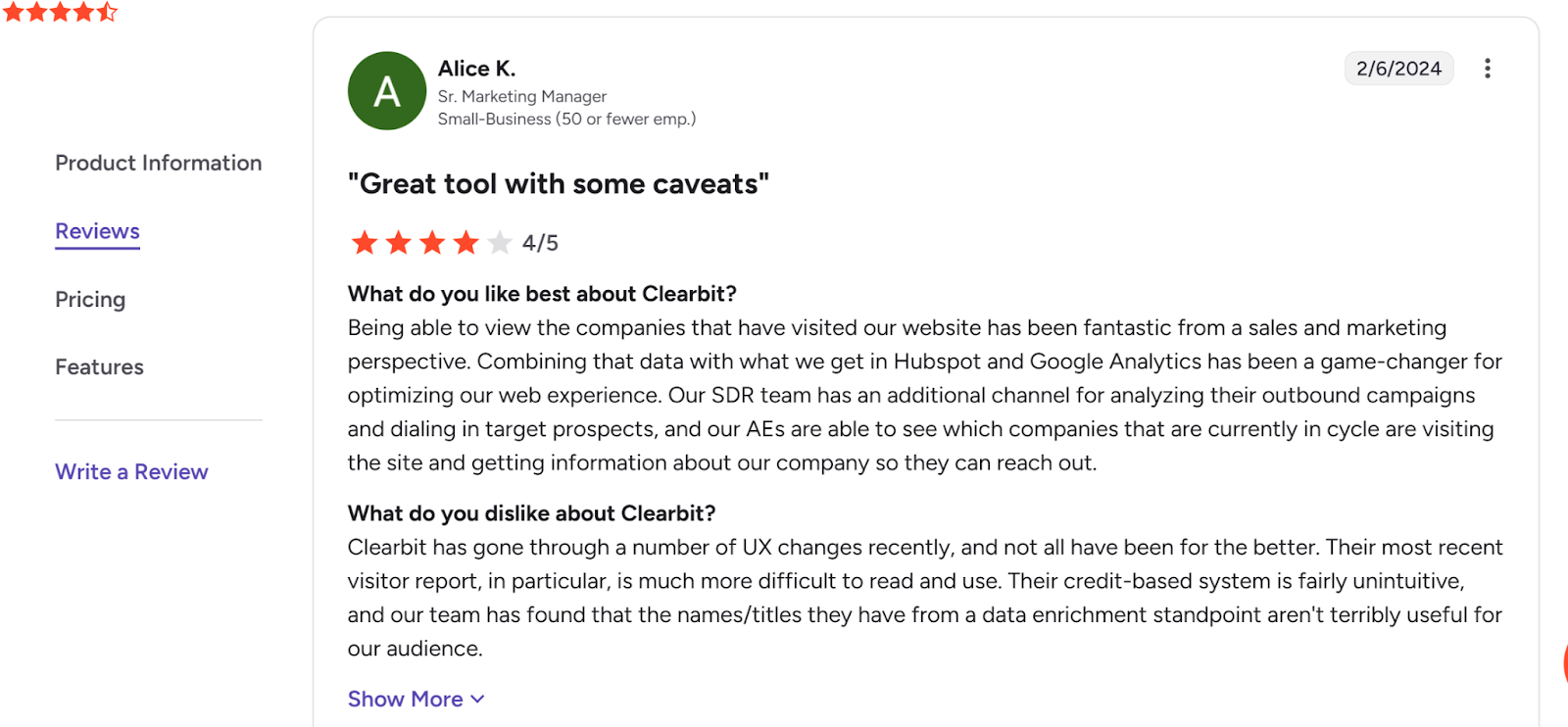
3. AeroLeads

AeroLeads is a lead generation and contact database tool designed for sales and marketing teams to find verified email lists and phone numbers in real time. It works as a Chrome plugin that helps users build prospect lists directly from platforms like LinkedIn, Crunchbase, AngelList, and more. AeroLeads pulls relevant contact details such as email addresses, job titles, company names, phone numbers, and business locations to support outreach efforts.
What makes it unique?
AeroLeads allows users to extract and verify contact details directly from LinkedIn using its real-time Chrome plugin.
Key features
- Real-time email and phone number extraction
- LinkedIn, Crunchbase, AngelList, and Xing integration
- Chrome plugin for seamless prospecting
- Email verification feature
- Export data to CSV or transfer to CRM
- Team collaboration support
- Company and job title-based filtering
- Data enrichment for existing contacts
- API access for custom integration
Pros
- Easy LinkedIn contact extraction
- Fast and real-time lead building
- Integrates with major CRMs
- Supports bulk data export
- Helps validate and verify emails instantly
- Suitable for both small and large teams
Cons
- Limited contact credits in basic plans
- Requires Chrome extension for full functionality
- Accuracy may vary for niche industries
- Manual list building can be time-consuming without automation
Pricing
The pricing plans of AeroLeads are listed below.
- Free trial: AeroLeads offers a free trial to users to explore the features that paid plans provide.
- Take off: This pricing plan costs $39/month if billed annually and provides 24,000 credits per year, 960 personal phone numbers guaranteed, 1 user access, and a dedicated account manager.
- Climb: The Climb plan costs $129/month if billed annually and provides 96,000 credits per year, 2400 personal phone numbers, 5 user access, and a dedicated account manager.
- Cruise: This plan costs $249/month if billed annually and provides 240,000 credits per year, 4800 personal phone numbers, access to unlimited users, and an account manager.
- Enterprise: The Enterprise plan’s pricing can be requested by a vendor, which includes all the features of the Cruise plan, plus credits, valid emails, and personal phone numbers as per the user’s needs.
Customer reviews
G2 gives 4 stars out of 5 to AeroLeads. AeroLeads is praised for quickly finding lead info like emails and phone numbers, plus easy CSV export. However, users feel the interface is outdated and suggest lowering the price.
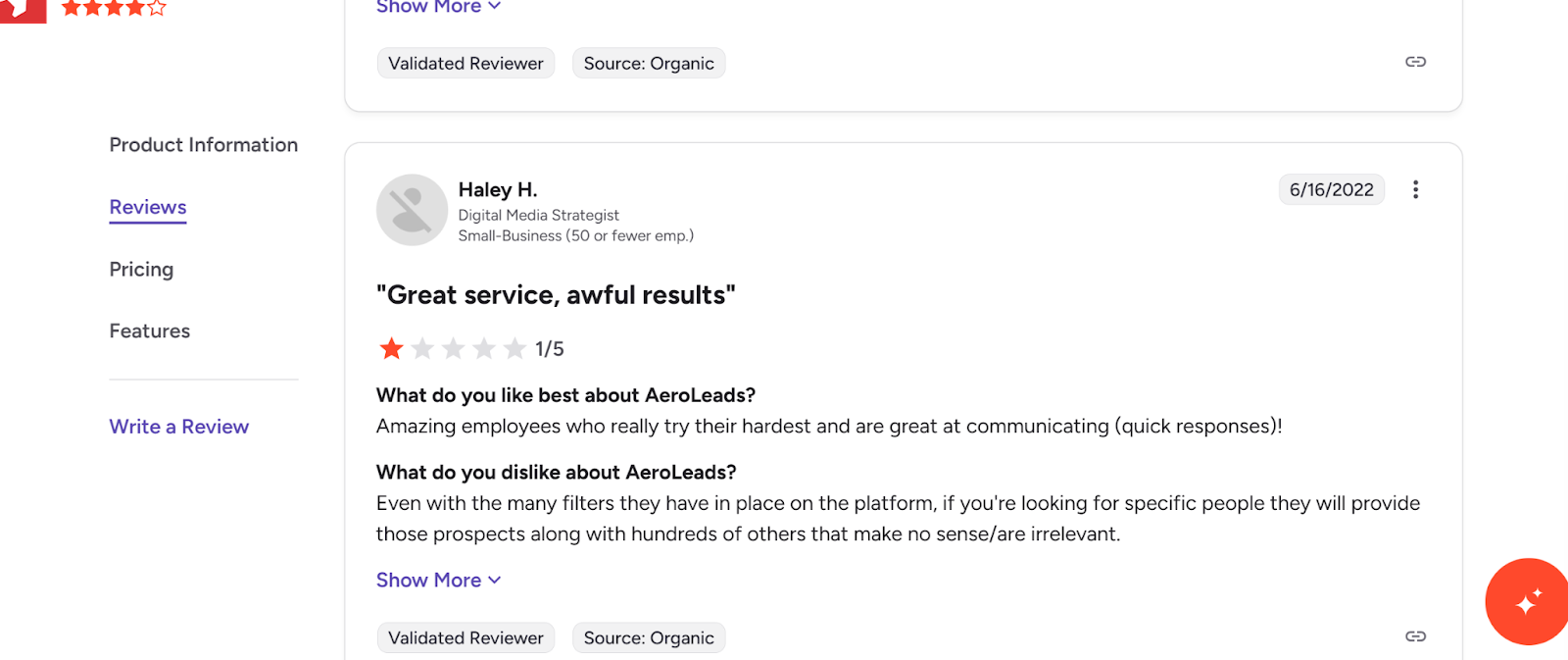
4. Apollo.io

Apollo.io is a B2B sales intelligence and engagement platform that offers a contact database that helps sales and marketing professionals find prospects, reach out to them, and move them through the sales pipeline. The platform includes verified B2B contacts along with automation tools for outreach, CRM integration, and intent-based prospecting.
What makes it unique?
Apollo.io provides real-time intent data to prioritize outreach based on buyer signals.
Key features
- Access to 265M+ verified contacts
- Advanced lead search and filters
- AI-powered email writing assistant
- Buyer intent signals
- Sequence automation
- LinkedIn integration
- CRM integrations (Salesforce, HubSpot, etc.)
- Call dialer and call logging
- Team performance analytics
- Real-time email validation
- Export lists in CSV format
- Chrome extension for LinkedIn prospecting
Pros
- Large and regularly updated contact database
- Real-time verified email lists
- Seamless integration with CRMs
- Built-in dialer and outreach automation
- AI tools for faster messaging
- Helps prioritize high-intent leads
Cons
- Learning curve for new users
- Limited features on the free plan
- Occasional data accuracy mismatches
Pricing
The pricing plans of Apollo.io are listed below.
- Free plan: Includes unlimited email credits, 5 mobile credits, and 10 export credits per month.
- Basic plan: Starts at $49/month and includes 75 mobile credits and 1,000 export credits per month.
- Professional plan: Starts at $79/month and includes 100 mobile credits and 2,000 export credits per month.
- Organization plan: Starts at $119/month and includes 200 mobile credits and 4,000 export credits per month.
Customer reviews
Apollo.io is valued for affordable pricing, unlimited email credits, and LinkedIn integration. Users like the free plan but mention confusing pricing, occasional data issues, and concerns about email accuracy on paid plans. It got 4.7 stars out of 5 at G2.
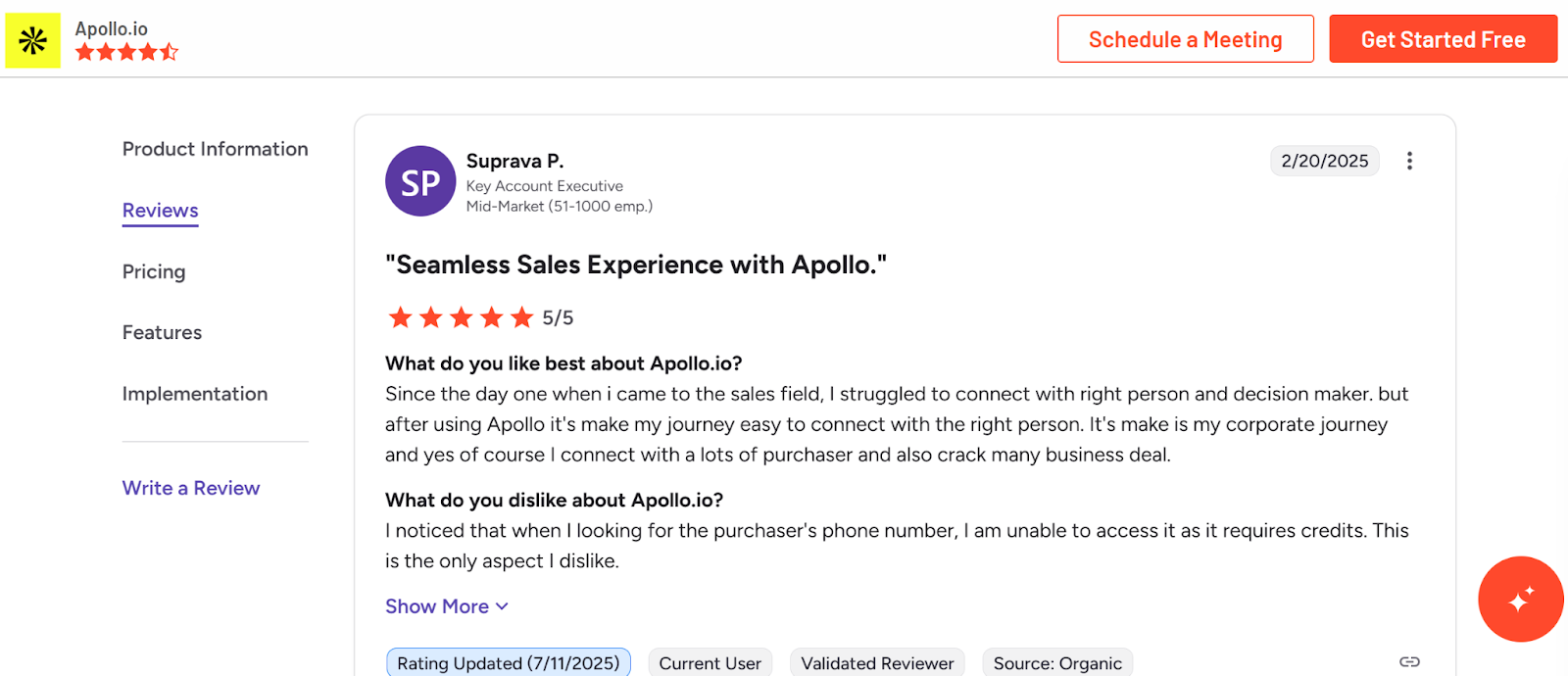
5. Cognism

Cognism is a global B2B contact database and sales intelligence platform that offers verified business emails and mobile numbers across regions like the US, EMEA, and APAC. It helps sales, marketing, and RevOps teams by delivering accurate and compliant data to drive prospecting, enrichment, and outreach workflows.
What makes it unique?
It offers phone‑verified mobile numbers (“Diamond Data®”) with cross-reference to 13 countries' Do‑Not‑Call (DNC) lists for compliant outreach.
Key features
- Phone‑verified direct dials (Diamond Data®)
- B2B email addresses with messaging notifications
- Global compliance (GDPR, CCPA, DNC list scrubbing)
- Extensive international coverage (NAM, EMEA, APAC)
- AI Search (text or voice)
- Sales Companion browser extension (LinkedIn & websites)
- Cognism Enrich for CRM data refresh
- Intent data via Bombora
- Sales trigger data
- Integrations with Salesforce, Outreach, HubSpot, Salesloft
- Unlimited person & company data access
- Continuous data monitoring across hundreds of sources
- Insights from intent signals, funding, hiring, and tech usage
Pros
- High data accuracy and reliability
- Strength in EMEA/Europe coverage
- Intuitive interface and ease of use
- Efficient CRM enrichment and cleansing
- Excellent customer support and onboarding
Cons
- High pricing for small teams or early‑stage companies
- Occasionally outdated or incomplete data
- Some UI complexity requires training
- Duplicate contacts or CRM sync issues at times
Pricing
The pricing plans of Cognism are listed below.
- Grow: The pricing of the Grow plan is available on custom demand. It includes essential contact and company data for prospecting.
- Elevate: Elevate plan’s price is also available on custom request. It offers features of the Grow plan, plus advanced intelligence and actionable signals.
Customer reviews
Cognism has a rating of 4.7 out of 5 on Capterra. Cognism is praised for its ease of use, accurate contact data, and time-saving features. However, some users report occasional outdated or missing information, especially in niche industries, which slows outreach efforts.
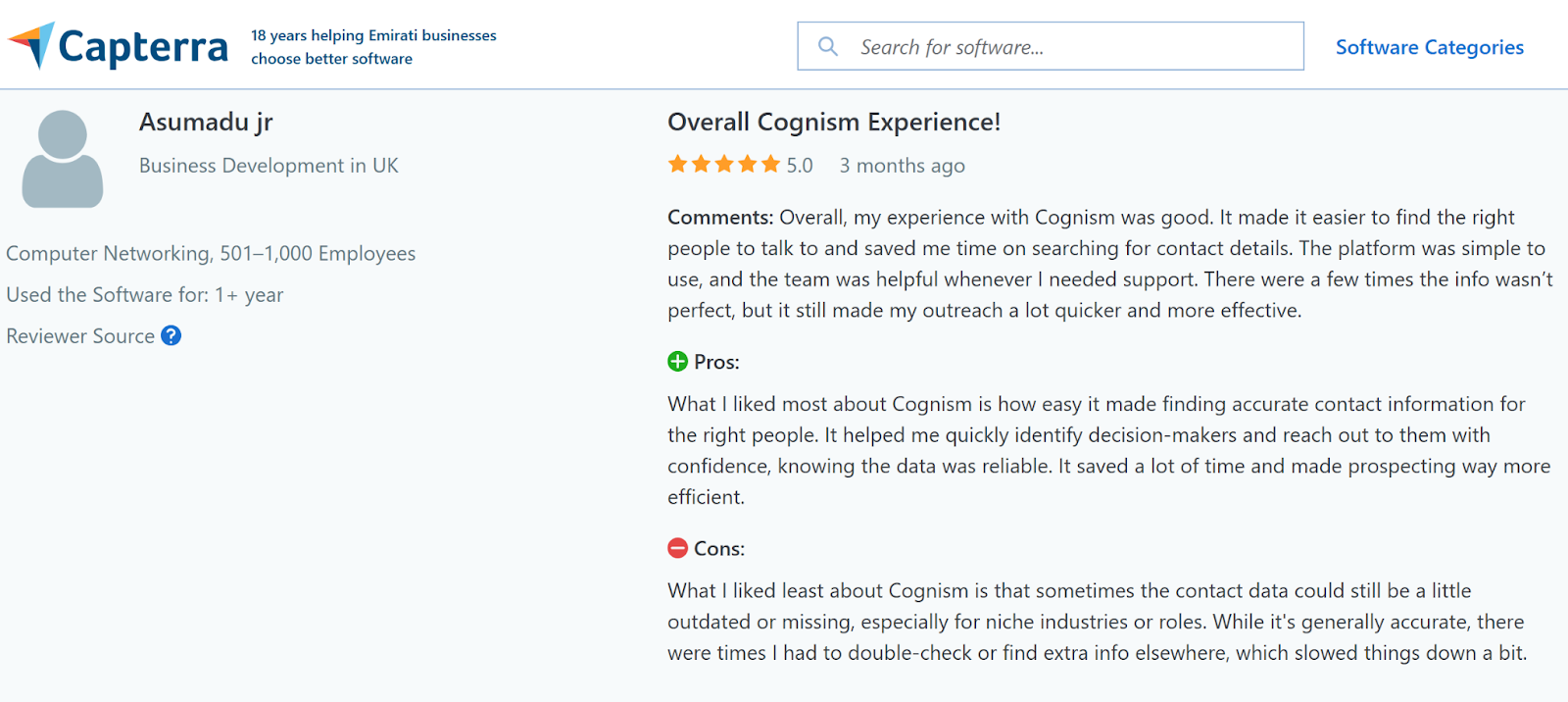
6. Seamless.AI

Seamless AI is a real-time AI-powered sales intelligence platform and contact database that helps B2B sales and marketing teams discover, verify, and enrich leads quickly. With access to over 1.3 billion contact records and 121 million company profiles, it finds verified emails, direct dials, firmographics, and intent signals inside the CRM or via its Chrome extension.
What makes it unique?
Its real‑time AI validation makes sure that contact data is current and verified as users search.
Key features
- Real‑time verified contact search
- Mobile and direct dial collection
- Company and firmographic profiles
- Buyer intent signals
- Job change tracking
- Data enrichment via any email, phone, or domain
- Chrome browser extension (e.g., LinkedIn scraper)
- CRM integrations (Salesforce, HubSpot, Zoho, etc.)
- AI-powered research assistant
Pros
- Instant access to up‑to‑date emails & phone numbers
- Rich lead context: intent, technographics, org charts, social profiles
- Seamless CRM pipeline integration
- Chrome extension for fast LinkedIn harvesting
- Saves time on list building, freeing reps for outreach
Cons
- Occasional data inaccuracies and email bounces
- Unclear or confusing pricing and auto‑renewal terms
- Customer support and billing resolution can be slow or inconsistent
- Lacks built‑in outreach automation and analytics
Pricing
The pricing plans of Seamless.AI are listed below.
- Free: The free plan of Seamless.ai costs $0/month and 50 credits for a lifetime.
- Pro: This plan is based on custom pricing. It offers a pay-per-user model with daily credit refreshes.
- Enterprise: The Enterprise plan is also customized. It offers unlimited users with custom credits.
Customer reviews
G2 rates Seamless.AI 4.4 out of 5. Seamless.AI has a user-friendly interface, helpful support, and affordability for small businesses. However, concerns include high pricing, lack of monthly plans, auto-renewal issues, and inconsistent lead quality. Some feel it does not deliver enough value compared to cheaper alternatives.
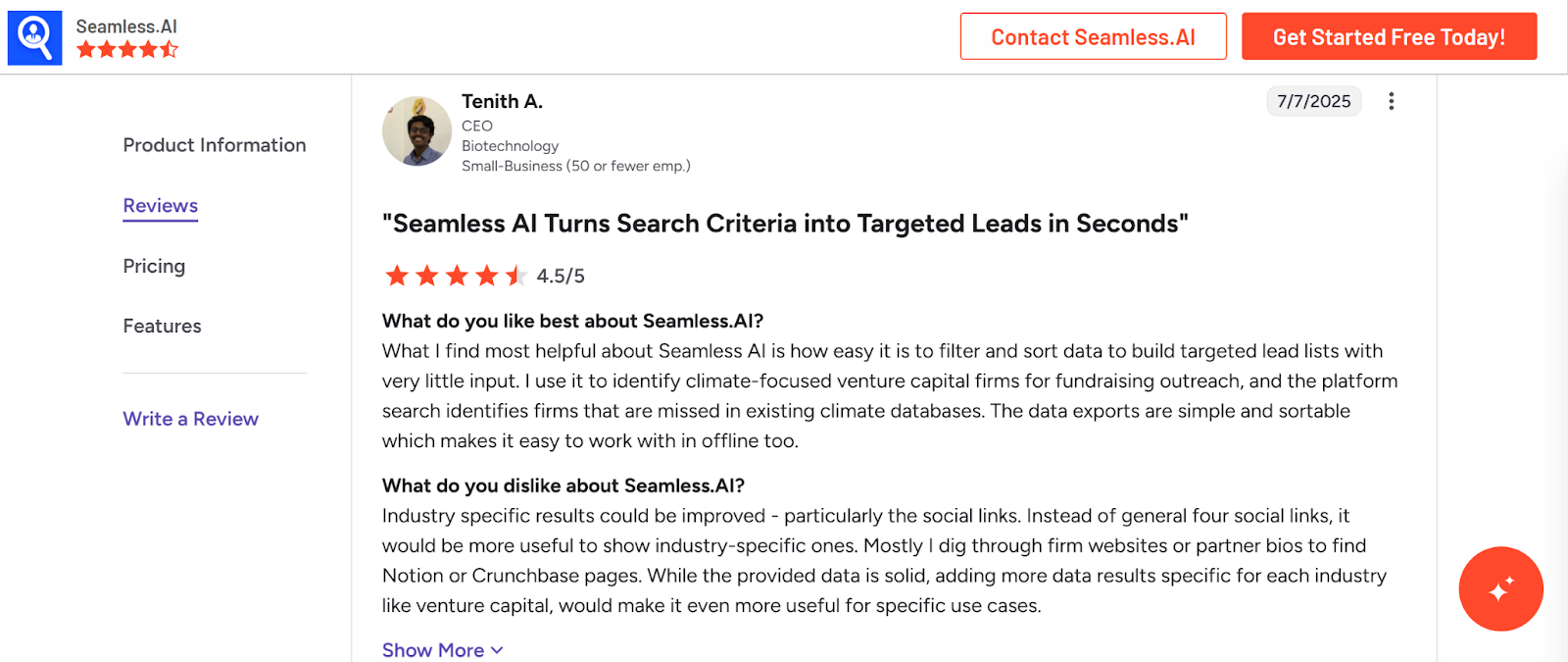
7. Kaspr

Kaspr is a B2B prospecting tool that has a LinkedIn Chrome Extension and a web application that provides instant access to accurate phone numbers and email addresses. It is designed for sales, recruitment, and founder teams, particularly across Europe, with over 500 million verified, GDPR- and CCPA‑compliant contact records. Users can capture data directly from LinkedIn, bulk enrich lead lists, organise prospects, and integrate seamlessly with popular CRMs and tools like HubSpot, Salesforce, Pipedrive, and Aircall.
What makes it unique?
Kaspr offers real-time contact data verification across 150+ sources and provides high data accuracy when prospects are captured on LinkedIn.
Key features
- LinkedIn Chrome Extension for one‑click data on profiles, lists, groups, and events
- Access to over 500 million verified phone numbers and email addresses
- Bulk‑enrich lead lists via web app workflows or widgets
- Lead management through lists, notes, tasks, and automated workflows
- Integrations with HubSpot, Salesforce, Pipedrive, Lemlist, Aircall, Ringover, Zapier, Brevo, and Zoho
- API access for automating contact data enrichment
- Team analytics and actively reporting
- GDPR and CCPA compliance for legal prospecting
Pros
- High-quality, GDPR-compliant data for European markets.
- User-friendly interface with simple design.
- Affordable pricing plans with a free tier.
Cons
- Requires Chrome/browser support for the extension
- Potential credit costs for large teams
- The feature set is focused on data capture, lacks advanced intent signals or intent tracking
Pricing
The pricing plans of Kaspr are listed below.
- Free Plan: This plan starts at $0/month and includes unlimited B2B email credits, 5 phone credits, 5 direct email credits, and 10 export credits.
- Starter plan: The Starter plan costs $45/user/month and offers 1,200 phone credits, 60 direct email credits, and 3,000 export credits.
- Business plan: This plan starts at $79/user/month and provides 2,400 phone credits, 2,400 direct email credits, and 3,000 export credits.
A free trial is available, and users gain unlimited B2B email credits by inviting three colleagues to join Kaspr.
Customer reviews
Kaspr is appreciated for its seamless LinkedIn integration and ease of use. However, users dislike the limited trial credits, outdated contact info, and the need to earn credits to search leads. It has a rating of 4.4 on G2.
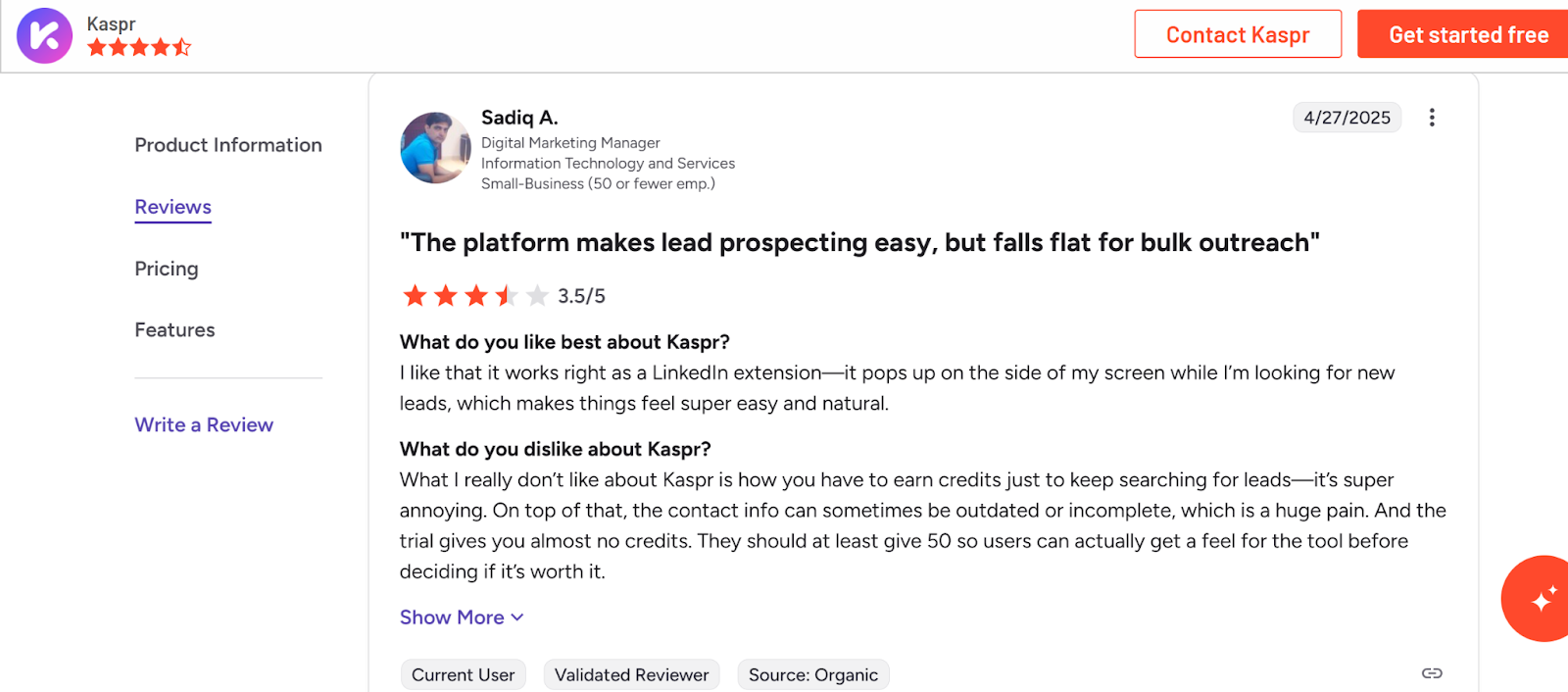
8. LinkedIn Sales Navigator

LinkedIn Sales Navigator is a B2B contact database and sales intelligence tool built into the LinkedIn platform. It helps sales and marketing teams find, connect with, and manage leads by using advanced search filters, personalized insights, and real-time updates. The platform uses LinkedIn's vast professional network to provide access to decision-makers and verified business profiles. Email lists pricing often depends on factors like contact accuracy, data volume, and targeting capabilities.
What makes it unique?
LinkedIn Sales Navigator offers access to LinkedIn’s full network, not just first-degree connections.
Key features
- Advanced lead and company search filters
- Real-time sales updates
- Lead recommendations
- CRM integrations (Salesforce, Microsoft Dynamics 365, HubSpot, etc.)
- Notes and tags for saved leads
- TeamLink for warm introductions
- InMail messaging to reach prospects directly
- Account mapping and organization charts
- Smart Links for content sharing and engagement tracking
- Mobile app access
- Buyer intent signals
- Alerts on job changes and company news
Pro
- Direct access to verified LinkedIn profiles
- Reliable buyer intent insights
- Personalized lead recommendations
- Trusted by global enterprises
- Helps identify warm paths through mutual connections
Cons
- Limited email and phone data compared to dedicated contact databases
- Requires an active LinkedIn account for full functionality
- InMail limits per month
- Cost may be high for small teams, and email list pricing varies
Pricing
The pricing plans of LinkedIn Sales Navigator are listed below.
- Core: The Core plan costs $79.9/month and $959.88/year, which includes advanced search filters, alerts on lead and account activities, and lead recommendations.
- Advanced: The advanced plan of LinkedIn Sales Navigator costs $179.99/month and $1679.88/year. It includes Core features, plus Smart Links, Team Links, and CSV upload.
- Advanced Plus: Users can get custom pricing for this Advanced plan after booking a demo. It includes Advanced features, plus 50 InMail messages, TeamLink extension, real-time contact updates, and advanced CRM integration.
Customer reviews
G2 rates LinkedIn Sales Navigator 4.3 out of 5. Users find LinkedIn Sales Navigator valuable for accessing decision-makers, using InMails, and using advanced search tools. It is seen as worth the cost for startups and larger teams. However, many say it is overpriced for individuals, with limited features, a clunky interface, and frustrating subscription and trial management issues.
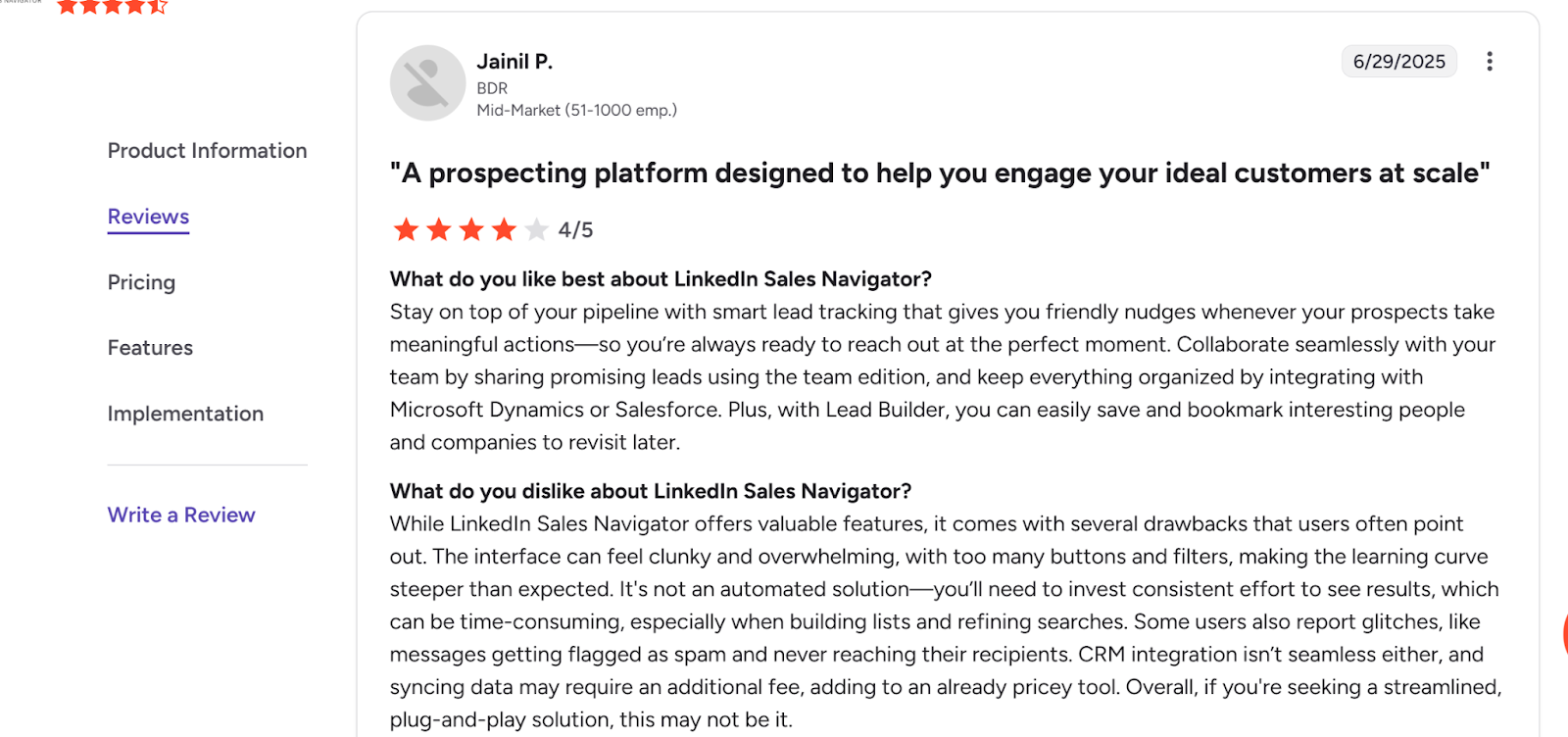
9. RocketReach

RocketReach is a powerful and modern business contact database that helps users find verified emails, phone numbers, and social links for professionals across the globe. It pulls contact data from public sources and company websites, which allows users to build accurate lead lists for B2B outreach. It provides verified email addresses, phone numbers, and social media links from a global database of over 700 million professionals and 60 million companies.
What makes it unique?
It delivers real-time AI-powered contact recommendations based on your search activity and intent data.
Key features
- Vast global contact and email marketing database
- Advanced search filters (100+ filters)
- Intent data insights
- RocketReach messaging tool
- AI‑powered recommendations
- Real-time email & phone verification
- Browser extension for Chrome/LinkedIn
- Bulk CSV import/lookup
- CRM and API integrations (Salesforce, HubSpot, Zapier)
- Prospect list building and management
- Email deliverability monitoring
Pros
- User-friendly interface with easy search functionality
- Affordable pricing plans for small businesses
- Supports team collaboration through shared lists and export options
Cons
- Limited filters and a smaller database compared to other data vendors.
- Data accuracy varies, with some outdated or incorrect information as compared to RocketReach alternatives
- High RocketReach pricing for beginners
Pricing
The pricing plans of RocketReach are listed below.
- Essentials: Starts at $39/month and offers 1,500 annual lookups.
- Pro: Starts at $72/month and offers 3,600 annual lookups.
- Ultimate: Starts at $180/month and offers 10,000 annual lookups.
Customer reviews
RocketReach is valued for its affordability, ease of use, and accurate data, making it ideal for small businesses. Users appreciate free credits and fair pricing. However, some find it costly monthly, with limited credits, billing issues, and no recurring trial. It has a rating of 4.1 on Capterra.
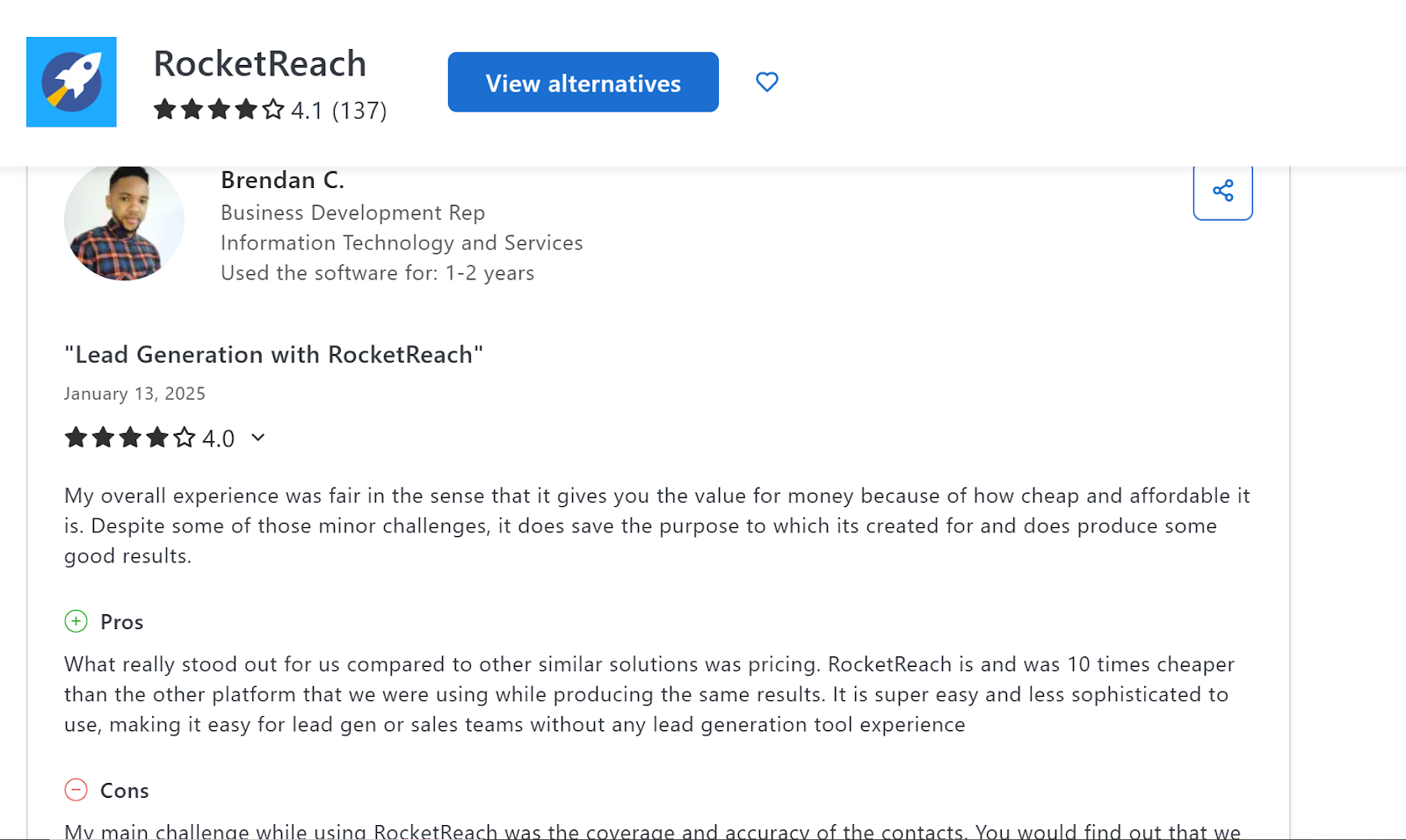
10. ZoomInfo

ZoomInfo is a B2B intelligence platform that provides access to a comprehensive contact database of over 100 million business professionals and 14 million companies. It is designed for sales, marketing, and recruitment teams to identify, engage, and convert high-value leads. The platform offers verified contact details, such as direct phone numbers, email addresses, company insights, and org charts. ZoomInfo combines firmographic, technographic, and behavioral intent data to help users target the right decision-makers and accelerate the sales pipeline.
What makes it unique?
ZoomInfo offers real-time intent data that helps identify prospects actively searching for your solutions, unlike many ZoomInfo competitors.
Key features
- B2B contact and company database
- Real-time buyer intent signals
- Technographic and firmographic data
- Website visitor tracking
- Sales automation tools
- Enrichment and data cleansing
- Conversation intelligence
- Pipeline forecasting
- AI-powered lead scoring
- Chrome extension for on-the-go prospecting
- Integrations with CRM and marketing platforms
Pros
- Accurate and detailed contact data
- Strong intent signal capabilities
- Automated workflows for outreach
- Deep CRM integrations
- Powerful filtering for targeting
Cons
- Expensive for small businesses
- Learning curve for new users
- Occasional data duplication
- Limited international data coverage
Pricing
ZoomInfo offers tiered annual pricing based on features and user access.
- Professional Plan: This plan costs $14,995/year, includes basic database access and core features.
- Advanced Plan: The Advanced plan costs $24,995/year, adds intent data and advanced filters.
- Elite Plan: It costs $39,995/year, includes full customization, premium support, and deep integrations. Pricing is annual and based on a minimum seat count. Free trials are not publicly available.
Customer reviews
ZoomInfo Sales is praised for its strong features, ROI, and support, especially by larger companies. Users like the free trial and updated contact data. However, many find it expensive, confusing to price, and less ideal for small businesses. Complaints include data inaccuracies, poor support, and inflexible subscription terms. It has a rating of 4.1 on Capterra.
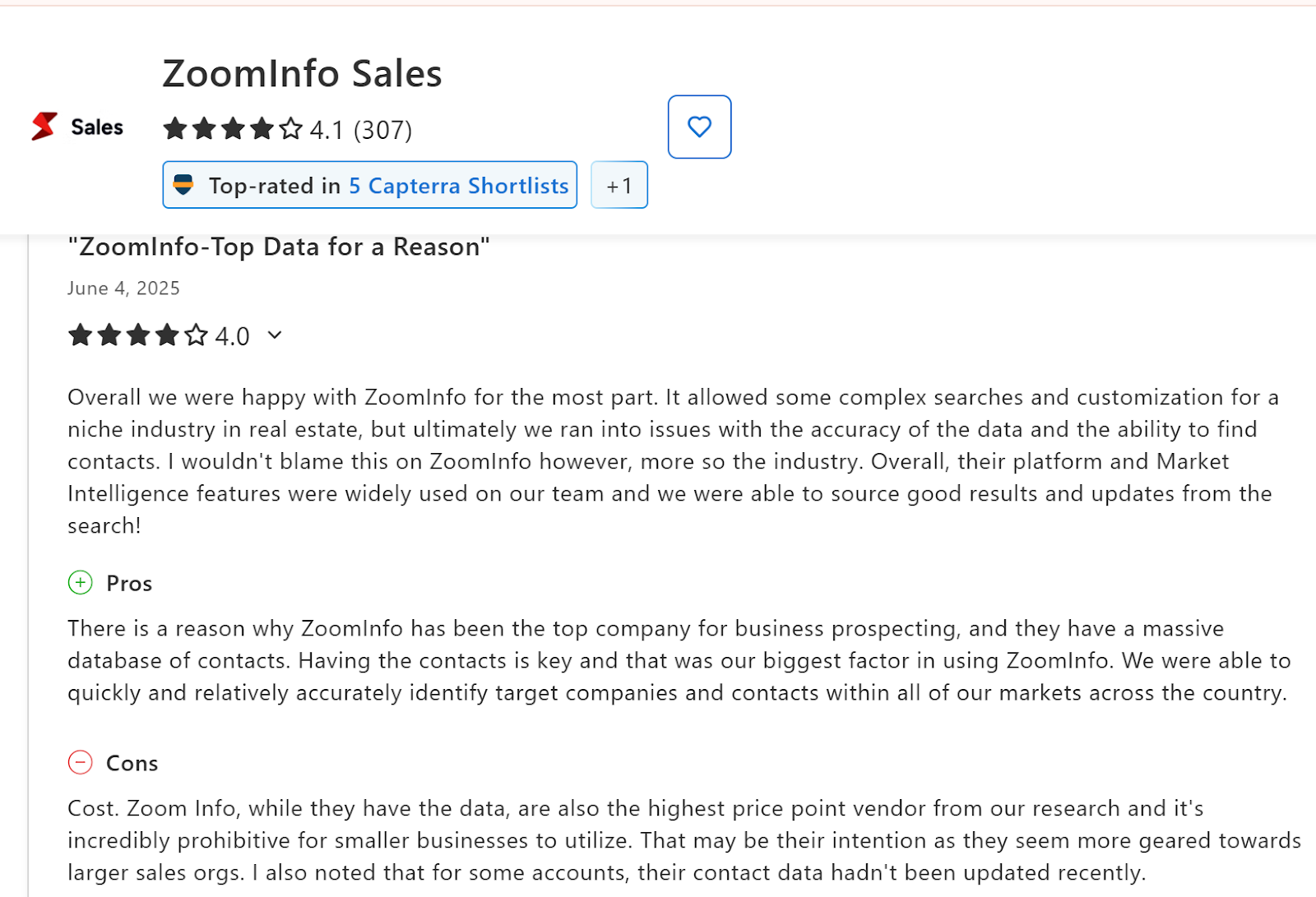
11. UpLead

UpLead is a B2B lead generation and sales intelligence platform designed to help businesses connect with high-quality prospects. It offers access to a real-time, verified database of over 160 million business contacts across more than 200 countries. Users can search for leads using over 50 filters, including industry, location, company size, job title, and more. Sales teams use UpLead to build targeted B2B contact lists and high-quality email lists for cold outreach and lead nurturing.
The main differences between UpLead and ZoomInfo lie in data accuracy and cost-efficiency. UpLead prioritizes verified contacts with a 95% accuracy rate, while ZoomInfo delivers broader firmographic insights and advanced intent data.
What makes it unique?
UpLead verifies emails before you download them and gives accurate and ready-to-use contact data for high-quality outreach.
Key features
- Verified emails and direct mobile dials with a 95% accuracy rate
- Advanced search filters (industry size, job title, location)
- Tracks buyer intent signals
- A visitor tracking feature to identify anonymous website visitors
- Copilot (an artificial intelligence tool) to automate tasks and provide detailed profiles
- A Chrome extension
Pros
- Sales and marketing teams’ effective collaboration
- Better lead quality
- Saves time on manual prospecting
- Support business growth as the team grows
- Syncs contact and company data with CRM and marketing automation tools
Cons
- Paid plans are more expensive as compared to other intent data providers
- Outdated contact databases
- Limited free access
- Users need to schedule a mandatory demo before exploring the platform
Pricing
The pricing plans of ZoomInfo are listed below.
- Lite: This plan costs $0 for a 14-day free trial, and allows 10 contacts per month.
- Professional: The Professional plan costs $14,995 per year, which includes advanced search capabilities, data enrichment, integration options, and 5,000 bulk credits annually.
- Advanced: The advanced plan costs $39,995 and offers real-time buying intent signals, API integrations, enhanced automation tools, and 10,000 annual bulk credits.
- Elite: The Elite plan costs $40,000 per year, which includes intent data, detailed organizational charts, technographic, and 20,000 bulk credits annually.
Customer reviews
Users appreciate UpLead’s real-time email verification, intuitive interface, and targeted search features. However, some report delays in email verification, challenges in finding specific contacts, and occasional listings of outdated leads.
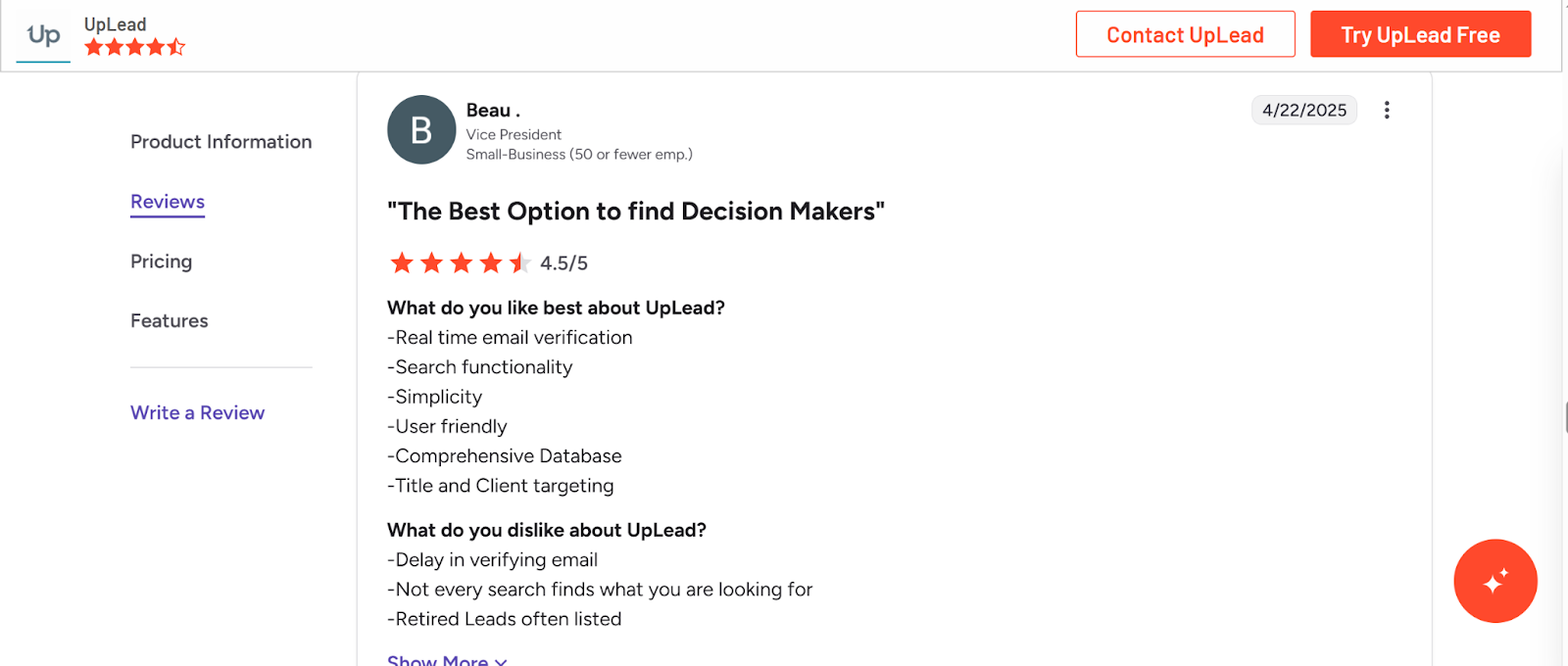
12. Lusha

Lusha is a B2B sales intelligence platform that helps users find contact and company information to generate leads and close deals. The tool is designed for sales, marketing, and recruitment professionals. Lusha provides accurate contact data such as email addresses and phone numbers from a global business network. It is used by over 1 million sales professionals and trusted by companies like Google, Dropbox, and Uber.
What makes it unique
It combines AI‑driven intent signals with its extensive contact database to prioritize high‑potential prospects.
Key features
- AI‑powered contact & company search with advanced filters
- AI‑generated daily prospect recommendations
- A browser extension to access contacts while browsing professional networks like LinkedIn, Gmail, and Salesforce
- GDPR, CCPA, ISO 27001 & 27701 compliant
- Automated email‑sequence outreach with AI
- CSV bulk enrichment uploads
- Buyer intent and intent‑based filters
- Lead scoring & pipeline workflows
- Meeting conversation analytics (“Conversations” feature)
Pros
- User-friendly interface
- Improved targeting
- Easy integration with popular CRM tools to manage the lead generation process
- Affordable pricing for small businesses
Cons
- Not always accurate data for niche industries
- Credit limitations
- Customer support challenges
- Phone number credits are used up quickly with frequent searches.
Pricing
The pricing plans of Lusha are listed below.
- Free trial: Lusha offers a 7-day free trial and 70 Lusha credits per month.
- Pro: The Pro plan of Lusha costs $22.45/month for users starting at 3600 credits/month.
- Premium: The Premium plan offers 800 credits monthly at $69.90 per month when billed monthly.
- Scale: Users of the Scale plan can request the vendor for custom pricing based on team size.
Customer reviews
G2 rates Lusha 4.3 out of 5. Users like how Lusha helps companies achieve high email deliverability, build outbound sales from scratch, and engage more customers quickly. However, users suggest that Lusha should add an option to update the outdated contact details.
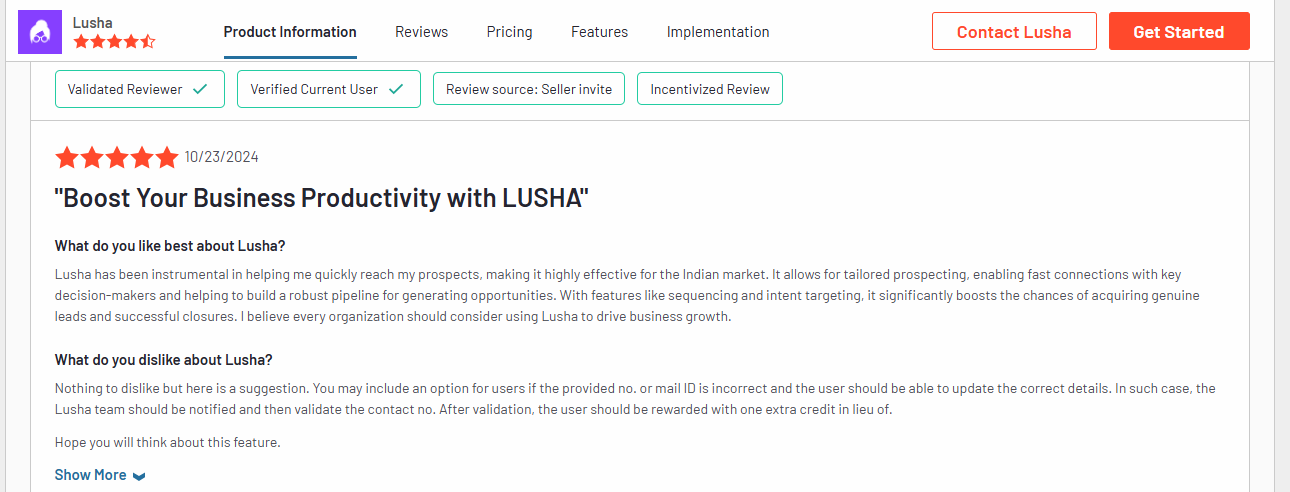
13. ContactOut

ContactOut is a contact database and email lookup tool primarily used by sales professionals, recruiters, and marketers to find verified contact information. It integrates with LinkedIn and allows users to extract email addresses, phone numbers, and social profiles of professionals, even if they’re not publicly listed. ContactOut allows users to build lead lists, conduct bulk searches, and export data directly to CRMs with access to over 250 million profiles and 30 million companies.
What makes it unique?
ContactOut offers access to over 75% of the U.S. professional workforce's personal emails, so it is one of the most extensive email databases available.
Key features
- Chrome extension for LinkedIn and GitHub
- Personal and work email discovery
- Phone number retrieval
- AI-powered contact search engine
- Bulk email lookup
- List building and exporting
- Team collaboration tools
- CRM integration
- Usage tracking and analytics
- Custom search filters
- GDPR and CCPA compliant
Pros
- High email accuracy
- User-friendly interface
- Fast data extraction
- Suitable for small and large teams
- Supports bulk searches
- Offers a free trial
Cons
- Limited free plan credits
- Mostly focused on email (limited social media data)
- Occasionally pulls outdated information
Pricing
The pricing plans of ContactOut are listed below.
- Free plan: The Free plan costs $0/month and provides 5 emails/day, 5 phones/day, and 5 exports/day. It also offers a browser extension, a search portal, a trial of premium features, and a 1 user per company limit.
- Email plan: The Email plan costs $49/month and provides unlimited emails and 300 exports/month. It offers all features of the Free plan, plus email campaigns, list builder tool, and a 1 user per company limit.
- Email+Phone plan: This plan costs $99/month and provides unlimited emails, unlimited phones, and 600 exports/month. It includes all the features of the Email plan, plus data enrichment, an AI email writer, and a 1 user per company limit.
- Team/API: This plan is a customized one and provides API access. It gives 20% more data coverage, bulk license with 700 million+profiles, works with Recruiter Pro, Salesforce, and ATS integrations, team management and reports, and a dedicated account manager.
Customer reviews
Users like ContactOut for its accurate email addresses and mobile numbers, which make it easier to reach out to prospects. However, some users dislike the limited monthly credits and mention that not all profiles show available contact information, even when numbers are listed. It has a rating of 4.5 out of 5 on G2.
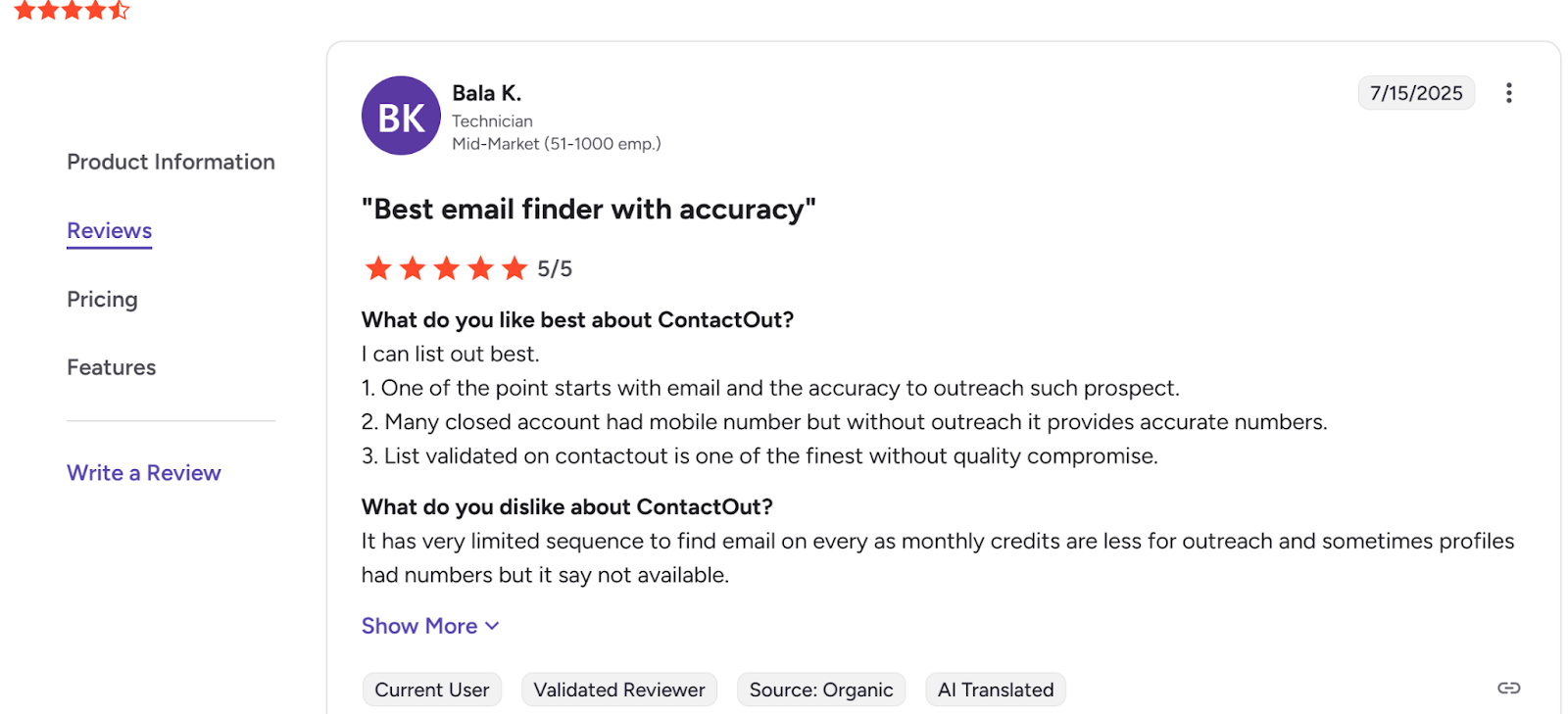
What is a B2B contact database?
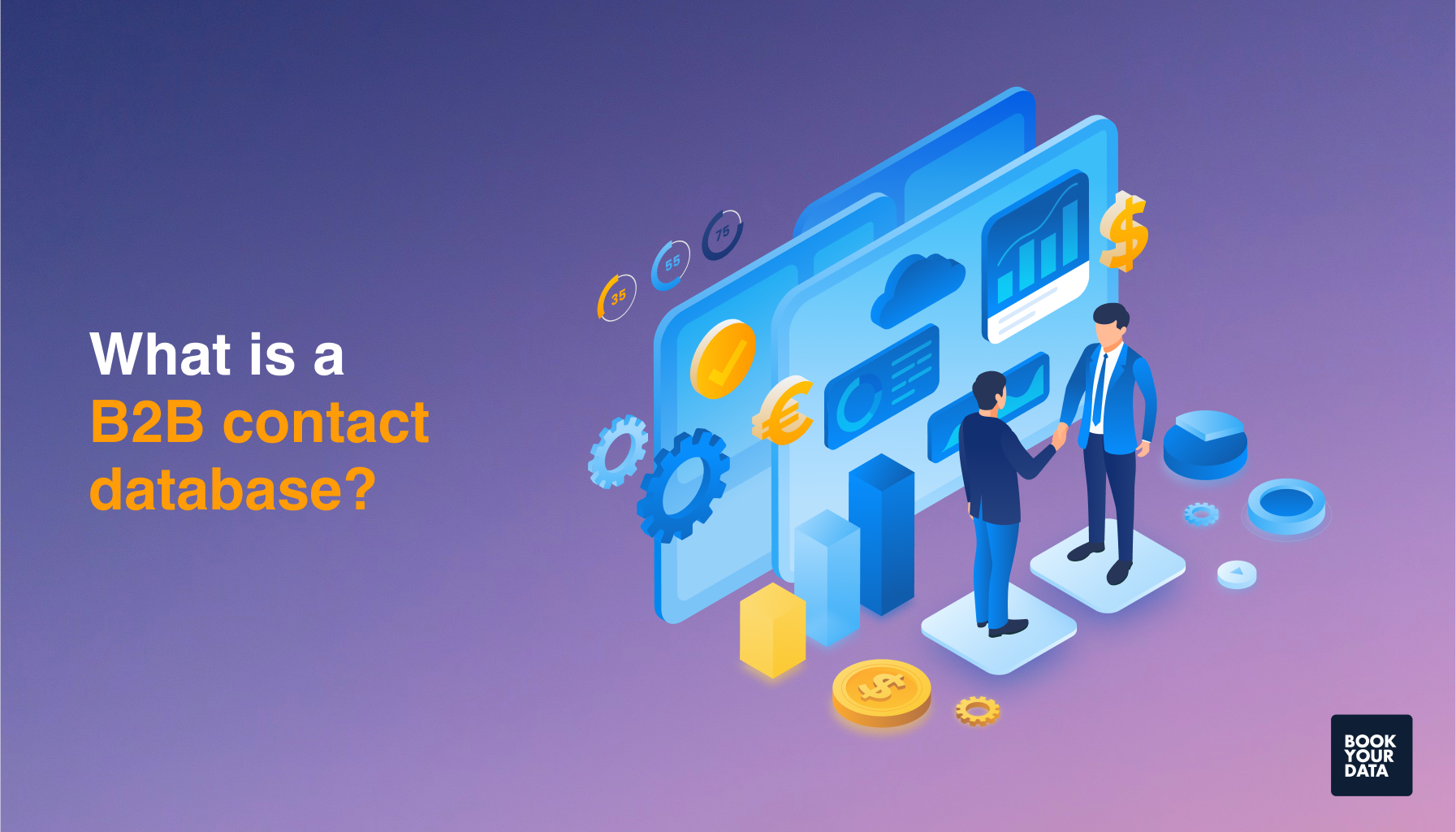
A B2B contact database is a digital collection of business-related contact information used by companies to connect with decision-makers, leads, and other professionals. It includes names, job titles, email addresses, phone numbers, company names, and other business details of people working in different industries. Sales, marketing, and recruitment teams use it to simplify the outreach process, improve targeting, and improve lead generation efforts.
A quality B2B contact database helps businesses save time by giving access to verified and segmented contact data.
The main features of a B2B contact database are listed below.
- Contact information, which includes names, email addresses, phone numbers, and social profiles
- Company details, such as industry, size, location, revenue, and technologies used.
- Job titles and roles
- Intent data to show if a contact is actively looking for a product or service
- Data segmentation to filter and sort contacts by industry, region, or job function
- CRM Integration with tools like HubSpot or Salesforce
- Regular data verification to reduce bounce rates and outdated leads
- Compliance with GDPR and CCPA
What are the benefits of the B2B contact database?
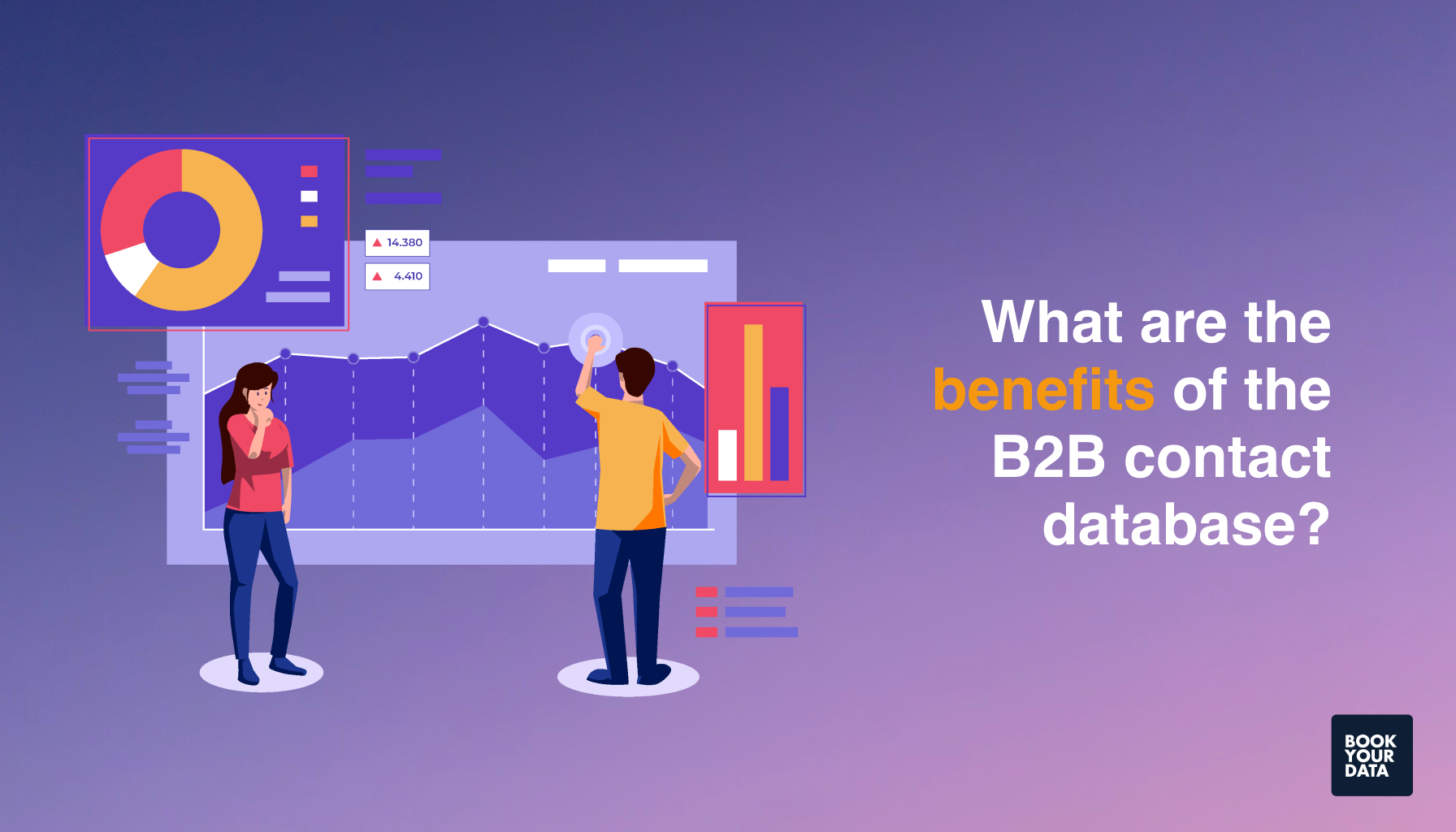
The benefits of the B2B contact database are improved lead targeting, better personalization, faster sales cycle, market insights, and improved compliance.
The benefits of the B2B contact database are listed below.
- Improved lead targeting: A well-maintained B2B contact database helps users target the right prospects at the right times. This helps them in doing more targeted outreach with detailed contact information and engaging with decision-makers who want to make purchasing decisions.
- Better personalization: Sales teams can customize their messages according to the demands of potential clients because they have enriched data from B2B contact databases, which includes professional backgrounds, company details, and recent activities. This leads to increased engagement, stronger relationships, and higher conversion rates.
- Faster sales cycle: A contact database helps sales teams by reducing hours spent on manually searching for contact details on LinkedIn, company websites, or industry directories. It gives them instant access to verified leads, CRM integration, which automatically enriches lead data and syncs with outreach tools, and automated follow-ups to engage with the leads at the right time.
- Market insights: B2B contact databases provide valuable market insights by offering detailed information about potential customers and their companies. This helps businesses to refine their marketing and sales strategies, personalize outreach, and improve overall efficiency.
- Improved compliance: Reliable contact databases provide data that is legally obtained and compliant with regulations. It helps businesses remove and mitigate risks associated with business communications to make sure that data is GDPR-compliant.
What are the disadvantages of a B2B contact database?
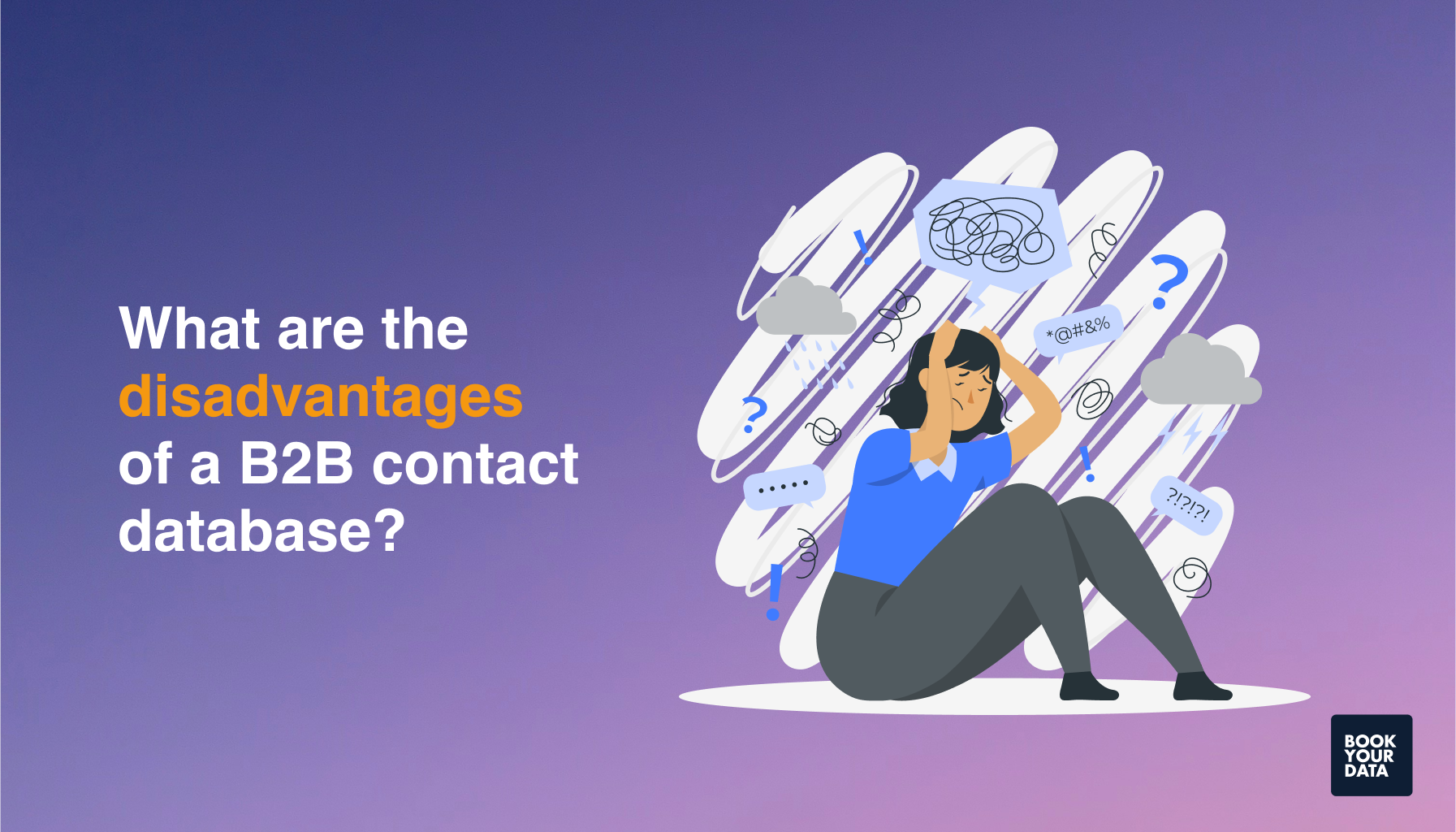
The disadvantages of a B2B contact database include outdated data, oversaturated prospects, and poor data organization.
The disadvantages of a B2B contact database are listed below.
- Outdated data: Most B2B contact databases are outdated, incomplete, and inaccurate, which results in wasted resources, failed marketing campaigns, and damaged brand reputation. Sales teams find it difficult to create customized marketing approaches and sales pitches because of insufficient data, which reduces ROI on lead generation efforts. Software buyers also shift tools often, so even if the contact is active, their needs may no longer align.
- Oversaturated prospects: Marketing agencies usually rely on contact databases to target CMOs and marketing managers. These decision-makers receive excessive pitches, so they become less responsive to unsolicited messages. It also increases the chances of getting flagged for spam or damaging sender reputation.
- Poor data organization: Businesses that use B2B contact databases find it challenging to identify patterns, trends, and insights that can inform sales and marketing strategies. Sales and marketing teams waste their time by going through irrelevant or outdated information, which results in missed opportunities, lower engagement, and inaccurate targeting.
What types of data do B2B contact databases provide?
The types of data that B2B contact databases provide include contact information, intent data, company details, technographics, social and digital footprints, firmographics, and competitor intelligence tools.
The types of data that B2B contact databases provide are listed below.
- Contact information: B2B contact databases offer direct contact details of professionals working in various companies. This includes names, job titles, business email addresses, direct phone numbers, and LinkedIn profiles. Many platforms also support email searches by name, which helps users find specific contacts faster. These databases verify the data regularly to reduce bounce rates and improve outreach accuracy. Businesses use this data to segment prospects, build targeted campaigns, and increase engagement rates across email, phone, and social platforms.
- Intent data: Intent data means behavioral signals that show a company’s interest in specific products or services. B2B databases gather this data by tracking activities like website visits, keyword searches, content downloads, and ad clicks. Marketers and sales teams use this to prioritize outreach, customize messaging, and reduce the sales cycle. It helps in proactive engagement with companies showing real-time buying interest.
- Company details: Company data includes comprehensive profiles of businesses, such as company name, size, industry, year founded, headquarters location, revenue, and ownership type. Some databases also offer details about subsidiaries, executive teams, and operational regions. This information helps teams qualify leads based on company fit, such as targeting only mid-sized IT firms or enterprise-level manufacturers.
- Technographics: Technographic data shows the technologies and software solutions that a company uses. This includes CRMs, marketing tools, cloud platforms, analytics software, and security systems. It helps businesses identify if a company uses a competing product, a complementary tool, or does not use a certain technology.
- Social and digital footprints: This data includes a company’s or contact’s online behavior and presence across digital platforms. It covers activity on LinkedIn, Twitter, and other social networks, along with content engagement, blog contributions, and digital ad interaction. Sales and marketing teams use this data to personalize outreach, engage on the right platforms, and build trust faster.
- Firmographics: Firmographic data includes business-related attributes like industry type, employee count, revenue range, company age, and market served. This helps teams filter and target companies based on business characteristics. For example, a cybersecurity firm might target tech companies with over 1,000 employees. Firmographics support B2B marketing, segmentation, ABM, and campaign targeting.
- Competitor intelligence tools: Some B2B contact databases use tools to monitor competitors. These tools gather data such as hiring trends, customer reviews, technology changes, ad spending, and messaging updates. This helps businesses track how competitors operate and identify market gaps. By analyzing this data, companies can adjust their positioning, refine offers, and predict competitor moves.
You can give a try for BookYourData’s B2B Contact Database
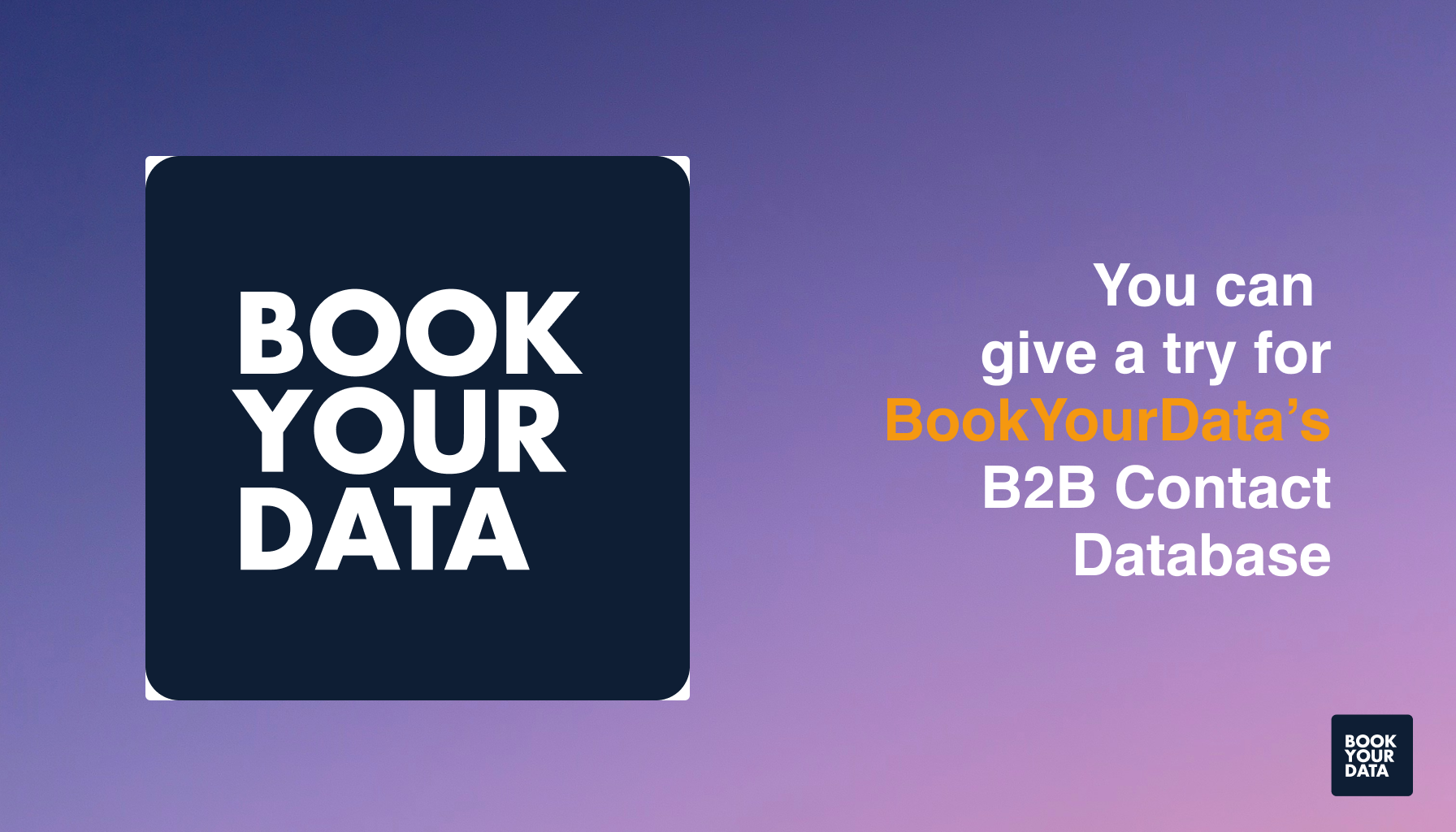
BookYourData is the best tool for businesses that need accurate, customizable, and ready-to-use B2B contact data. It offers real-time verification, industry-specific filtering, and a pay-as-you-go model, which allows users to explore the features of the platform without having any long-term subscription. BookYourData provides email verification, firmographics filters, CRM integration, and clean exports, whether you're building targeted campaigns or scaling your outreach. Its intuitive interface saves time, while the precision of its data helps increase conversions. It is a practical, flexible, and reliable choice for businesses of all sizes.

How to choose the best B2B contact database?
To choose the best B2B contact database, determine your needs, evaluate data accuracy, assess the coverage and depth of data, check the integration capabilities, check the segmentation features it offers, check the compliance options, look for the reputation, consider the data sources, and also consider the customization options.
Determine the best possible B2B contact database for your business by first developing a plan for how you want to use it. Determine your target audience, make an ideal customer profile to choose the best contact database, and then decide on your purpose for using it, such as for prospecting, account-based marketing, data enrichment, or building an accurate email list.
Evaluate the data accuracy of the provided data and how often it is verified and updated. Make sure that the database includes all important information, such as contact names, email addresses, phone numbers, and job titles. An accurate dataset helps you avoid using the wrong spam filters and losing credibility as a sender.
Assess that the database should cover specific regions you are targeting. Choose a database that provides a good depth of information on the companies, such as business profiles and a variety of properties about their contacts.
Check whether the database can integrate with other tools, such as a CRM platform like Mailchimp or Salesforce. Integration with your existing tools can make it easier to manage your leads and simplify your sales process.
Look for the segmentation features provided by your chosen contact database provider. Always choose a database that allows you to filter contacts based on specific criteria, such as industry type, company size, job title, technology stack, and job location, so that you can easily track and prioritize your leads.
Make sure that your chosen database provider aligns with industry standards and ensures data compliance and privacy, such as with GDPR, CCPA, or CAN-SPAM. Confirm whether they obtain data through consent-based methods and give users the ability to opt out. Noncompliance with relevant laws in your jurisdiction results in a risk of legal action. Always choose a vendor that prioritizes ethical sourcing and respects international privacy standards.
A provider’s reputation shows its performance, reliability, and customer satisfaction. Research customer reviews on platforms like G2, TrustRadius, or Capterra. Check case studies, testimonials, and industry-specific feedback. Also, explore how long the provider has been in business and whether they are backed by recognized investors or partners.
Understanding how a database collects its data by asking whether the vendor uses public sources, web scraping, user-contributed data, partnerships, or proprietary technology. Databases using a mix of first-party and third-party verified sources are typically more reliable. Check if they list how often data is updated and how email addresses are verified. Knowing the sources also helps assess risk in terms of compliance.
Check if the database allows you to build and save custom segments, tag contacts, or set filters that align with your sales funnel. Some platforms also offer account-level targeting, lead scoring, or custom exports. Also, assess whether you can personalize data fields or integrate custom workflows.
Can a B2B contact database help generate business leads?
Yes, a B2B contact database helps generate business leads by acting as a reliable business leads database that provides verified contact details, company insights, and intent data. This helps businesses target the right audience, personalize outreach, and improve lead generation efforts with greater precision.
Do contact databases increase B2B sales productivity?
Yes, contact databases increase B2B sales productivity by providing accurate and up-to-date information for targeted outreach and personalized engagement. They improve lead generation, shorten the sales cycle, increase overall revenue growth, improve decision-making, and increase customer engagement.
What is the difference between a B2B contact database and an intent data provider?
The difference between a B2B contact database and an intent data provider is that a B2B contact database provides static information about a company and its employees, like company name, contact details, industry size, and location, while an intent data provider tracks a company’s online behavior to identify their interest, needs, and potential buying intent.
What role do B2B data providers play in creating a high-quality contact database?
The role B2B data providers play in creating a high-quality contact database is to provide accurate information about a company and its employees. It helps businesses target the right leads, personalize outreach, and improve overall sales and marketing efforts.
How can contact databases improve ABM strategies in B2B marketing?
Contact databases improve ABM strategies in B2B marketing by helping in creating more efficient marketing campaigns, providing optimized sales, improving client retention, and helping in better GTM collaboration.
What is the best B2B contact database?
BookYourData is the best B2B contact database because it offers access to over 250 million business contacts across 200+ countries, with a 97% data accuracy guarantee. It offers a free plan and a pay-as-you-go email list-building plan without requiring long-term contracts and is ideal for any lead generation business.
Are B2B contact databases cost-effective?
Yes, B2B contact databases are mostly cost-effective, but it depends on several factors, which include the database size and accuracy, features and functionality, pricing model, ROI, integration capabilities, and the quality of provided email lists.
[CTA1]
[CTA2]
